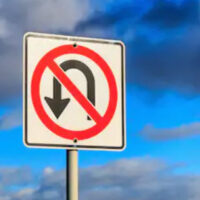Fatal U-Turn Crash in Lutz

Few details were available about a fatal wreck which occurred near the intersection of U.S. Highway 41 and Sunset Lane.
According to police and witnesses, 46-year-old Debra Beltramea, who was southbound on 41, attempted to make a U-turn onto the northbound side. In so doing, she collided with another northbound motorist, whose name was not released. The force of the collision caused both vehicles to spin out of control and eventually come to rest on the northbound side.
In Florida, non-intersection U-turns are generally illegal.
First Party Liability in Car Accident Claims
Each year, vehicle collisions seriously injure millions of Americans. Driver error causes about 95 percent of these incidents. Generally, that driver error involves negligence.
At its core, a negligence action is not about “blaming” anyone for the crash. We all make mistakes. Sometimes they are big ones and sometimes they are little ones. And, we must all accept the consequences of the mistakes we make. In this context, these consequences usually include financial responsibility for damages.
Most vehicle collisions involve the negligence per se (negligence “as such”) doctrine. Typically, drivers cannot travel more than a few blocks without violating at least one safety law. If that violation substantially causes injury, the tortfeasor (negligent driver) is presumptively negligent.
In Florida, the presumption of negligence becomes negligence as a matter of law if the tortfeasor violated a penal safety law, such as the DUI or reckless driving law. In these situations, victims need only prove cause.
Damages in a Florida vehicle collision claim normally include compensation for economic losses, such as medical bills, and noneconomic losses, such as pain and suffering.
Substantial compensation is available, but insurance companies do not simply give it away. To reduce or deny the victim’s compensation, insurance company lawyers typically use a number of legal loopholes. The contributory negligence defense is probably the most widely-used legal loophole in Florida.
This doctrine shifts blame for the crash from the tortfeasor to the victim. For example, in the above story, the victim’s U-turn might have been illegal, but the tortfeasor clearly was not maintaining a proper lookout.
In these situations, jurors must divide fault on a percentage basis between the victim and tortfeasor. Florida is a pure comparative fault state. So, even if the victim was 99 percent responsible for the wreck, the tortfeasor is still responsible for a proportionate share of damages.
Florida Wrongful Death Claims
If the victim dies, the case is more difficult for a Tampa personal injury attorney to successfully resolve, both from an evidentiary and procedural standpoint. However, these added difficulties should never stand in the way of fair compensation.
The police accident report is usually a key piece of evidence in a car crash claim. If the victim did not survive, the police report obviously contains only one side of the story. So, an attorney might need additional evidence to establish liability.
Procedurally, only the decedent’s legal representative has the authority to bring an injury claim. If there is no legal representative, the judge generally appoints one.
Damages are different as well. Generally, wrongful death claimants are only entitled to pecuniary losses, such as:
- Funeral and burial expenses,
- Future lost wages,
- Medical bills related to the decedent’s final injury or illness, and
- Decedent’s pain and suffering.
The survivors usually cannot obtain compensation for their own grief and suffering, unless the decedent was a blood or adopted child. Compensation might be available, under a separate theory like negligent infliction of emotional distress.
Reach Out to Dedicated Lawyers
Car crashes often cause serious injuries. For a free consultation with an experienced Tampa personal injury attorney, contact the Matassini Law Firm, P.A. Attorneys can connect victims with doctors, even if they have no money or insurance.
